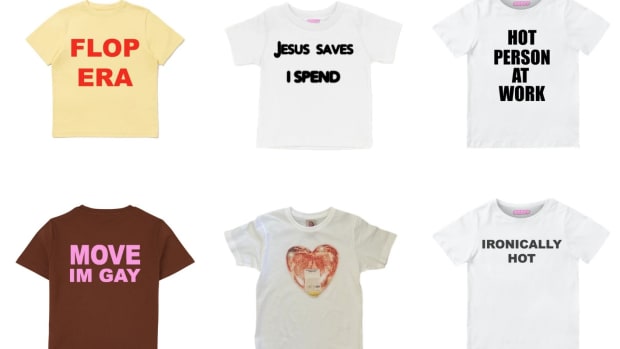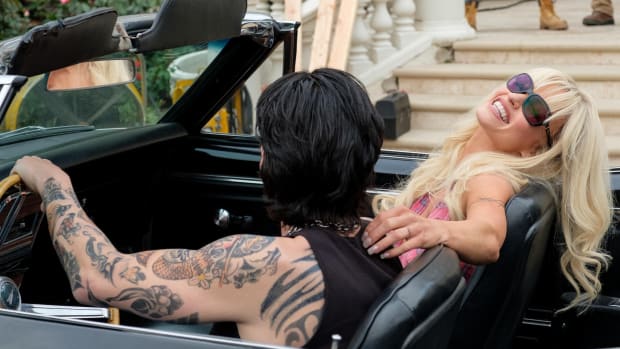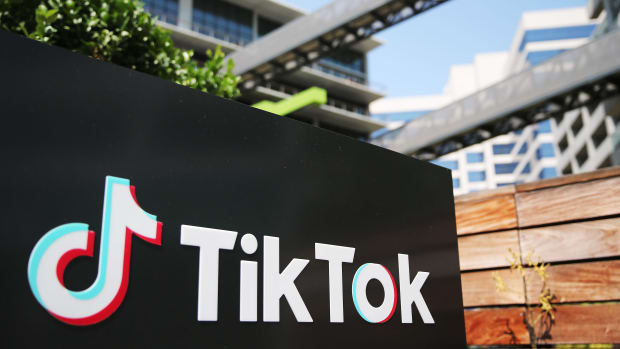Last December, superstar YouTuber Emma Chamberlain posted a close-up of a T-shirt with about a paragraph's worth of text. I stopped scrolling in awe, delighted by every word. It was that
feeling you get from a meme that makes you wonder, "How did this person get inside my brain?" But because it was on an item of clothing, I wasn't sure if I wanted to buy it or just send the post to all my friends. I ended up doing both.
This is how I discovered OGBFF, a brand born on social media that consistently blurs the line between clothing and content.
Los Angeles natives Lauren Schiller and Angela Ruis started OGBFF (which stands for Original Best Friend) after bonding over their shared sense of humor, obsession with TikTok and natural impulse to create things together. At the time, Ruis was making cut-and-sew clothes, and Schiller worked at a record label.
"We were hanging out at Angela's house, where we would spend a lot of our creative days," Schiller says. "We were sitting on her floor, I had Photoshop open on my computer and we were making a meme. She had a DTG [direct-to-garment] printer, so we were like, 'Let's print a meme on a shirt.'"
Using incongruous fonts reminiscent of Word Art, it read: "Back off / I have an extremely / crazy best friend / she has anger issues / & needs a therapist / treats me like a queen / don't flirt with me." They saw the shirt as a commemoration of their friendship.
Naturally, the co-founders took photos and posted them on their personal Instagram pages — "like, 'I made this shirt with my friend and we're selling them, if you want one,'" says Schiller. They quickly began selling tees via DM; Ruis estimates she had around 2,000 followers at the time, so interest was significant but not overwhelming. That, is until they took it to TikTok. It went viral pretty much immediately.
Like most people who go viral on TikTok, Schiller and Ruis were unprepared, still printing everything themselves at home and trying to process orders via DM. But once they had a customer base outside of their friend group, they began taking steps to build an actual brand: nailing down a name (with an available handle, of course), designing a logo, thrifting blanks to print on and creating a Depop shop. They planned to set up their own e-commerce site but thought customers might feel more comfortable purchasing through a trustworthy app than from a brand they'd never heard of. Depop also proved an effective promotional tool, its algorithms as helpful as TikTok's for delivering OGBFF's tongue-in-cheek designs to the people most likely to appreciate them.
"Each platform that we're on for promotion or e-commerce has its own benefits," says Schiller. "People are on TikTok to be entertained; on Depop, people are there to shop, and they have a smart algorithm that feeds people stuff they like, so when we were showing up in people's explore page, it was fabulous. I think Emma Chamberlain found us on Depop."
Indeed, hugely influential social-media stars have been spotted in the brand's recognizable tees, including Chamberlain, Addison Rae and Devon Lee Carlson, which has helped OGBFF blow up.
"It's crazy because the tier of the people that have been our supporters are like top-tier influencers," Schiller says. "If anybody is going to have an impact, it's these people."
Early on, Schiller and Ruis made a list of, per Ruis, "dream influencers who we'd love to wear our stuff." Within a few months, many of them were — and not only that, but they'd bought the pieces of their own accord. Was it simply the power of manifestation?
"We're such powerful manifest-ers, it's actually crazy — everything that we say almost immediately happens," says Schiller, joking: "It had nothing to do with work ethic."
Recommended Articles
As with most things, you can attribute some of OGBFF's success to timing and luck, but its co-founders also deserve credit for their clever tag-lines and designs, internet savvy and the work it takes to build a brand and keep up with demand as two people working out of a bedroom. And while they didn't invent the concept of printing meme-like designs on clothes (brands like Pizzaslime and Praying also occupy this genre, and even luxury houses like Balenciaga have experimented within it), Schiller and Ruis bring a distinctive female perspective and energy that sets OGBFF apart. They also don't rely on logo flips or other bootleg-esque tactics.
"One thing about our partnership that really works is the way that our minds meet," says Schiller. "I never lack weird, crazy ideas, but it's hard for me to be able to pick out one that someone would actually wear and like; that's where Angela is a genius. Not everything that I can think of needs to go on a T-shirt."
In addition to longer missives, the brand has found success with nostalgic references to 2000s-era pop-culture icons like Paris Hilton, Britney Spears and Holly Madison; as well as short-and-sweet quips like, "Hot person at work," "Ironically hot" and "Flop era," printed on tees, tanks, hats and more. It's basically clothing that doubles as content.
"Every time someone orders something, the rate of people that will take a picture post it and tag us is really high," says Schiller.
The brand is now averaging 200-500 orders per week, and Schiller and Ruis are slowly starting to scale up. They still thrift blanks themselves, but also work with a supplier to source larger quantities for more popular styles. They also outsource some work to creative friends (often people they met online), whether it's extra hands to print shirts or sew tags, web design or photography. At the end of this month, the brand has its first New York pop-up at Tired Thrift in Brooklyn. In March, the co-founders will move out of the bedroom and into a proper studio, which will have a designated area for photo and video shoots.
"So far, we've been playing one seven-months-long game of catchup, and we've finally been able to take a breath and plan ahead," says Schiller.
Going viral early on can create challenges for brands — risks include being unable to meet demand, oversaturation, knockoffs and losing momentum when subsequent drops alienate early supporters or fail to live up to initial hype. As they grow, Schiller and Ruis already seem mindful of those pitfalls.
The brand releases new product in small drops that sell out quickly, and they don't always race to restock, even with items they know will continue to sell, like the popular "Jesus saves / I spend" style, which has been sold out for over a month. "It's not to say that we won't restock it in the future, but we want people to focus on our other stuff," says Schiller. They're also weary of being pigeonholed as one type of clothing brand, or a clothing brand at all.
"Especially since we started doing interviews, it's like people understand our brand as a Y2K homage kind of brand, and we don't want to be understood as that," Schiller says. "I guess some of our designs do align with that resurgence that continues to be present in fashion, but our scope is much larger than that."
As they expand, they will release new designs, but they plan to focus just as much on creating new content for social media.
"A lot of people tune in to our brand, not just for our products, but also because of our process and our personalities. We go live in the studio a lot, just to talk to people and show them how we're making our stuff," Schiller says. "That seems to be something that's more malleable than a physical product."
Never miss the latest fashion industry news. Sign up for the Fashionista daily newsletter.



